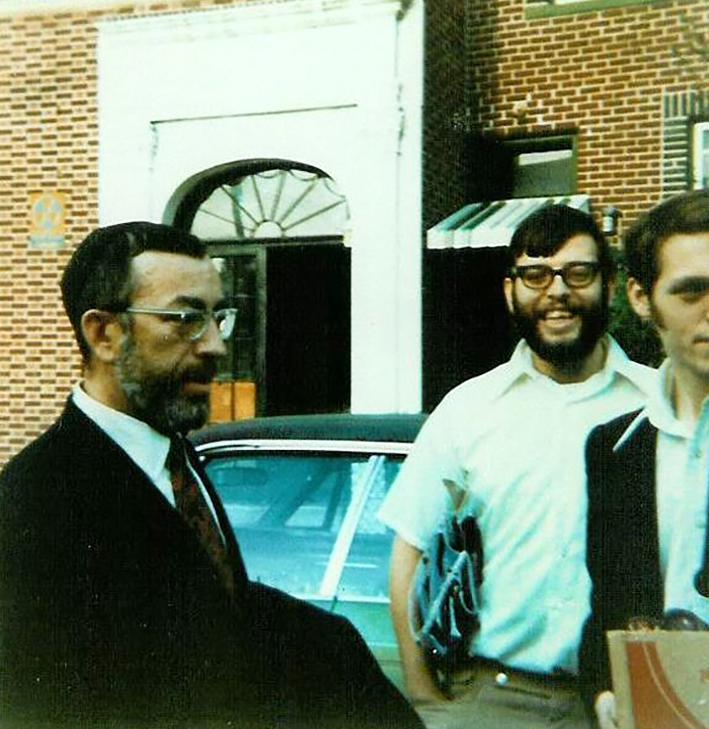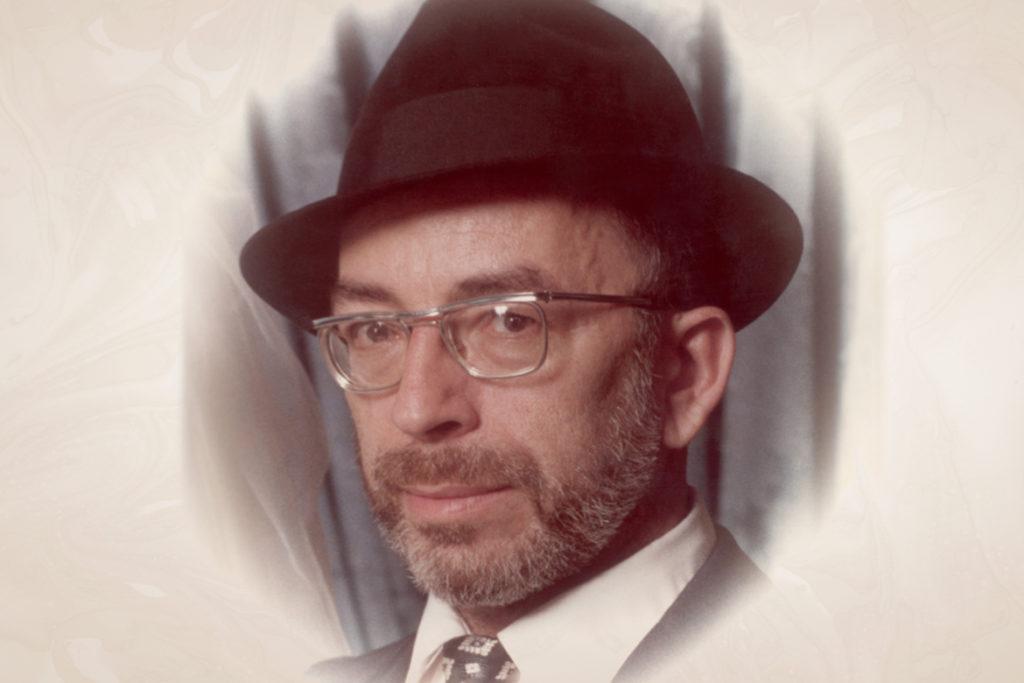The late Rabbi Zvi Aryeh Ben-Zion Rosenfeld z”l, whose 43rd yahrzeit is on the 11th of Kislev, was a fervent Breslov chassid who fled from honor and embraced simplicity. Through him thousands of people all over the US became acquainted with the spiritual path of Rebbe Nachman of Breslov. The Nachalat Zvi Institute (BRI) in Jerusalem was established in his memory.
This Sunday, the eve of 11th Kislev, we commemorate the 43rd anniversary of the passing of the late Rabbi Zvi Aryeh Rosenfeld, a descendant of Rabbi Aharon Goldstein, the Rabbi of Breslov, and one of the greatest disciples of Rebbe Nachman of Breslov.
Rabbi Zvi Aryeh Ben Zion Rosenfeld (1922-1978) was born into a deep-rooted family of Breslov chassidim. His father, Rabbi Israel Abba, was a direct descendant of both Rabbi Aharon, the Rabbi of Breslov, and Rabbi Shmuel Yitzchak, the Rabbi of Tcherin, two of Rebbe Nachman’s greatest disciples.
Rabbi Zvi Aryeh was born in 1922 in Gdynia, Poland. When he contracted diphtheria at just six months old, his father, Rabbi Israel Abba, approached the saintly Chafetz Chaim, Rabbi Yisrael Meir Kagan of Radin. The Chafetz Chaim blessed the baby and added the name Ben Zion to the baby’s original name, after which Zvi Aryeh recovered fully.

Rabbi Zvi Aryeh Rosenfeld z”l davening in the Kotel
The family came to the United States in 1923 and settled in the Brownsville neighborhood in Brooklyn. Rabbi Zvi Aryeh first studied at Yeshivas Rabeinu Chaim Berlin and continued at Yeshivah Torah Vodaath. He subsequently learned Torah from Rabbi Avraham Yoffen, the famous head of the Novardok-Beit Yosef yeshiva. At the age of twenty-three, after completing the entire Talmud for the second time, as well as mastering other studies, Rabbi Zvi Aryeh was ordained as a rabbi by his teacher Rabbi Yoffen and other prominent rabbis.
After his marriage to Tzippora, who came from the illustrious Feivelson family of Torah scholars, Rabbi Zvi Aryeh earned a living teaching Torah to young children. He instilled in his pupils a love of God and a love of Torah, his pure character leaving an indelible impression on them. Although Rabbi Tzvi Aryeh and his young family were barely scraping by, following his father’s passing in 1947, he assumed responsibility for some of his father’s charity obligations.
As part of those charity activities, Rabbi Zvi Aryeh began to correspond with the Breslover chassid, Rabbi Avraham Sternhartz, the great-grandson of Reb Nosson of Breslov. In 1949, he traveled to Eretz Yisrael to meet him personally, in what was the first of fifty subsequent trips to the Holy Land. From Rabbi Avraham, Rabbi Zvi Aryeh understood the tremendous need to spread Rebbe Nachman’s teachings in the United States, and from then on, Rabbi Zvi Aryeh saw this as his life’s mission.

Rabbi Zvi Aryeh Rosenfeld z”l during one of his trips to Eretz Israel
For the next thirty years, Rabbi Zvi Aryeh was involved with spreading Rebbe Nachman’s teachings throughout the United States. Without any help and lacking all financial means, he managed to bring thousands of Jews closer to Judaism and to the teachings of Rebbe Nachman. At first, his holy work was not appreciated; he had to deal with angry parents who sent him death threats, and one who even tried to have him arrested for kidnapping (cf Sipurey Maasios – 12). However, he persevered in his sacred work and brought thousands of Jews to Torah observance and to learn about Judaism for the first time in their lives, always with pleasantness, “b’darkei noam.”
At great risk to his life, Rabbi Zvi Aryeh did everything possible to travel to Rebbe Nachman’s grave in Uman, Ukraine, at the height of Soviet rule. It took a great deal of courage in those days to venture behind the Iron Curtain. With unmatched dedication, he organized trip after trip with his students, stealthily making his way to the holy site. His determination eventually led to the collapse of the Soviet regime, after which the gates of Uman were opened wide to all Breslovers. To mark this triumph, the “Gate of Zvi Aryeh,” which decorates Rebbe Nachman’s tziyun, was established in his memory by his disciple Rabbi Shlomo Kopel.

Rebbe Nachman of Breslov’s tombsite in Uman. Above: the gate that was built in memory of Rabbi Zvi Aryeh Rosenfeld z”l
In his shiurim, attended by Ashkenazi and Sephardi students alike, Rabbi Zvi Aryeh would draw on his phenomenal knowledge of Talmud, Midrash, Zohar, Kabbalah and particularly the teachings of Rebbe Nachman. He also excelled in practical wisdom and gave excellent advice, including in financial and business matters. For himself, however, he was content with the minimum, and continued to support his family from his teacher’s salary.
Apart from the time he devoted to Torah lessons and teaching pupils, Rabbi Zvi Aryeh also devoted himself to raising funds for the central Breslov shul in Jerusalem, with the encouragement of Rabbi Avraham Sternhartz and Rabbi Eliyahu Chaim Rosen. In fact, he and his students raised the lion’s share of the funds for the large building that now stands in the center of Meah Shearim in Jerusalem. After the construction was completed, he continued to devote himself to publishing Rebbe Nachman’s writings and also began the translation of the book Rebbe Nachman’s Wisdom (Sichot Haran). It was later translated by Rabbi Aryeh Kaplan at the request of Rabbi Zvi Aryeh who sponsored the work and edited the book.

Rabbi Zvi Aryeh Rosenfeld z”l with Rabbi Eliahu Chaim Rosen z”l
Rabbi Zvi Aryeh also raised funds which he distributed to many poor Breslov families in Eretz Yisrael. He loved the Holy Land with all his soul and wanted very much to settle there himself. He would have made the move if not for the many new students in the United States who joined his classes every year. He once said that he would move to Jerusalem if a whole year passed without a new student joining the group… but that never happened!
Rabbi Zvi Aryeh attracted a group of students who established their own synagogue where Torah lessons were held according to the teachings of Breslov Chassidut. Several hundreds of families became acquainted with Breslov Chassidut and adopted it as their way of life; many thousands more know and quote the Rebbe’s teachings – all thanks to Rabbi Zvi Aryeh.
Rabbi Zvi Aryeh himself was living proof that even in a materialistic country like the United States, it’s still possible to be a Breslover chassid; i.e., a Jew who is attached to his Creator and not blinded by the illusions of the modern world.

Rabbi Zvi Aryeh Rosenfeld z”l in the USA with his students
In the summer of 1958, when he was fifty-six and after being diagnosed with cancer, Rabbi Zvi Aryeh finally fulfilled his lifelong dream of moving to Jerusalem, where he spent his last months preparing to leave this world. Even when he was confined to his bed and overcome with extreme weakness, his disciples would study Talmud and Zohar by his bedside, with Rabbi Zvi Aryeh following the discussion and commenting here and there.
Rabbi Zvi Aryeh had been a father figure to his students, many of whom came to Israel for a few days just to be by his side for the last time. Despite his extreme weakness, he persisted in reciting the “Tikun Haklali” (General Remedy) often with the help of one of his students.
Rabbi Zvi Aryeh left behind a legacy that includes thousands of hours of recorded lessons and lectures, which provide a broad glimpse into Rebbe Nachman’s treasures.
Recently, a new project was launched to transcribe the recordings. So far, the lessons on the series of Sichot Haran in English have already been published, and we are currently working on editing volumes with the English lessons. We are also working to translate the English shiurim into Hebrew and compiling them into a book, to be called Siach HaNeshamah.
May his merit protect us!
Photo gallery of Rabbi Zvi Aryeh Rosenfeld z”l

Rebbe Nachman of Breslov’s tombsite in Uman in the year 1922, the year of his birth

Rabbi Zvi Aryeh Rosenfeld z”l holding the original kiddush cup which belonged to Rebbe Nachman

Rabbi Zvi Aryeh Rosenfeld z”l davening in the Kotel

Rabbi Zvi Aryeh Rosenfeld z”l in the tombsite of Shmuel Hanavi




















